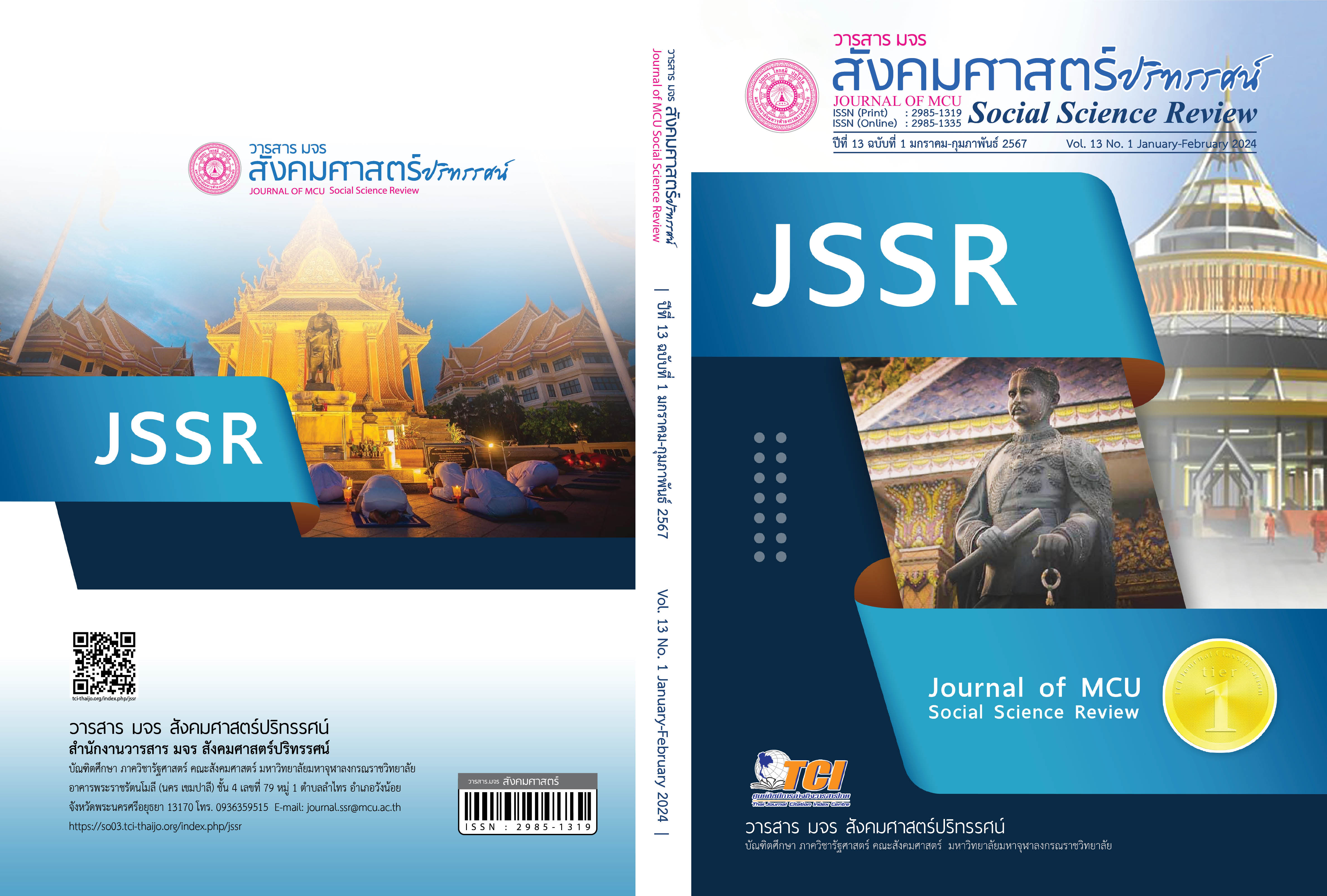ความสัมพันธ์ระหว่างทักษะภาวะผู้นำด้านซอฟท์สกิลกับการบริหาร โรงเรียนทวีธาภิเศกให้เป็นโรงเรียนแห่งความสุข
คำสำคัญ:
ภาวะผู้นำ, ซอฟท์สกิล, การบริหารโรงเรียนแห่งความสุขบทคัดย่อ
บทความวิจัยนี้มีวัตถุประสงค์ 1. ศึกษาระดับทักษะภาวะผู้นำด้านซอฟท์
สกิลของผู้บริหารสถานศึกษาโรงเรียนทวีธาภิเศก 2. ศึกษาระดับการบริหารโรงเรียนทวีธาภิเศกให้เป็นโรงเรียนแห่งความสุข 3. ศึกษาความสัมพันธ์ระหว่างทักษะภาวะผู้นำด้านซอฟท์สกิลกับการบริหารโรงเรียนทวีธาภิเศกให้เป็นโรงเรียนแห่งความสุข ประชากร ได้แก่ ครู โรงเรียนทวีธาภิเศก จำนวนทั้งสิ้น 116 คน ปีการศึกษา 2564 เครื่องมือที่ใช้ในการวิจัยเป็นแบบสอบถามมาตรส่วนประมาณค่า 5 ระดับสร้างโดยผู้วิจัย มีค่าความเชื่อมั่น .962 สถิติที่ใช้ในการวิเคราะห์ข้อมูลได้แก่ ค่าร้อยละ ค่าเฉลี่ย ส่วนเบี่ยงเบนมาตรฐาน และค่าสัมประสิทธิ์สหสัมพันธ์แบบเพียร์สัน
ผลการวิจัยพบว่า 1. ระดับทักษะภาวะผู้นำด้านซอฟท์สกิลของผู้บริหารสถานศึกษาโรงเรียนทวีธาภิเศก ในภาพรวมและรายด้านทุกด้านอยู่ในระดับมาก 2. การบริหารโรงเรียนให้เป็นโรงเรียนแห่งความสุข โดยภาพรวมและรายด้านทุกด้านอยู่ในระดับมาก และ 3. ความสัมพันธ์ระหว่างทักษะภาวะผู้นำด้านซอฟท์สกิลกับการบริหารโรงเรียนทวีธาภิเศกให้เป็นโรงเรียนแห่งความสุข โดยภาพรวมมีความสัมพันธ์ทางบวก อยู่ในระดับสูงมาก อย่างมีนัยสำคัญทางสถิติที่ระดับ .01 (r=.921 , p < .01)
เอกสารอ้างอิง
กัลยมน อินทุสุต. (2554). ความฉลาดทางอารมณ์ของผู้บริหารสถานศึกษาขั้นพื้นฐาน. วารสารการบริหารการศึกษา มหาวิทยาลัยศิลปากร, 2(1), 25-42.
จุฑามาศ แก้วพิจิตร และคณะ. (2556). 123 สู่การเป็นองค์กรแห่งความสุข. กรุงเทพฯ: สำนักงานกองทุนสนับสนุนการสร้างเสริมสุขภาพ.
จุฑามาศ ศิลป์ไพบูลย์พานิช. (2558). ความสัมพันธ์ระหว่างทักษะการติดต่อสื่อสารของผู้บริหารกับประสิทธิภาพการทำงานเป็นทีมของครูในสถานศึกษา สังกัดสำนักงานเขตพื้นที่การศึกษาประถมศึกษากาญจนบุรี เขต 3 (วิทยานิพนธ์ครุศาสตรมหาบัณฑิต สาขาวิชาการบริหารการศึกษา). กาญจนบุรี: มหาวิทยาลัยราชภัฏกาญจนบุรี.
ชนิกา ตู้จินดา. (2552). Happy 8 Workplace ความสุข 8 ประการในที่ทำงาน. สืบค้น 24 ตุลาคม 2564, จาก http://www.thaihealth.or.th/node/12827
ชวนชม ชินะตังกูร และคณะ. (2560). ความสุขในการทำงานของบุคลากรการศึกษาสังกัดสถานศึกษาขั้นพื้นฐาน. วารสารศิลปากรศึกษาศาสตร์วิจัย, 9(2), 26-39.
นฤมล สุ่นสวัสดิ์. (2558). การตั้งเป้าหมายของชีวิตและการทำงาน. วารสารสารสนเทศคณะวิทยาการจัดการ มหาวิทยาลัยราชภัฎบ้านสมเด็จเจ้าพระยา, 14(2), 22-36.
บุญชม ศรีสะอาด. (2553). การวิจัยเบื้องต้น (พิมพ์ครั้งที่ 8). กรุงเทพฯ: สุวีริยาสาส์น.
พิิเชษฐ์ ลิขิตเลิศ. (2559). การสร้างแรงจูงใจในการปฏิบัติงานเพื่อการเพิ่มประสิทธิภาพของพนักงานขับรถบรรทุกกรณีศึกษา บริษัท เอบีซีโลจิสติกส์จำกัด (สารนิพนธ์วิทยาศาสตร์มหาบัณฑิต สาขาวิชาการจัดการโลจิสติกส์และโซ่อุปทาน). ชลบุรี: มหาวิทยาลัยบูรพา.
ยุพาวรรณ ทองตะนุนาม และคณะ. (2558). ปัจจัยพัฒนาองค์กรแห่งความสุข (ภาครัฐ) : การทบทวนวรรณกรรมอย่างเป็นระบบ. Journal of Health Science Research, 9(1), 53-62.
อุทัยวรรณ ศรีรัตน์. (2562). การเป็นโรงเรียนแห่งความสุขของโรงเรียนชุมชนบ้านหนองฝ้าย (การค้นคว้าอิสระ สาขาวิชาการบริหารการศึกษา). กรุงเทพฯ: มหาวิทยาลัยศิลปากร.
Brecht, G. (1996). Sorting out goals. Sydney: Prentice Hall.
Somerset, F. (2001). The softer side of leadership: How to take your leadership to deeper level. Journal of career intelligence, 75(7), 12-13.
Tang, K. N. (2012). Paper for seminar on Soft Skills Development for Higher Education Institute. Khon Kaen: Khon Kaen University.
ดาวน์โหลด
เผยแพร่แล้ว
รูปแบบการอ้างอิง
ฉบับ
ประเภทบทความ
สัญญาอนุญาต
ลิขสิทธิ์ (c) 2024 วารสาร มจร สังคมศาสตร์ปริทรรศน์

อนุญาตภายใต้เงื่อนไข Creative Commons Attribution-NonCommercial-NoDerivatives 4.0 International License.
เพื่อให้เป็นไปตามกฎหมายลิขสิทธิ์ ผู้นิพนธ์ทุกท่านต้องลงลายมือชื่อในแบบฟอร์มใบมอบลิขสิทธิ์บทความให้แก่วารสารฯ พร้อมกับบทความต้นฉบับที่ได้แก้ไขครั้งสุดท้าย นอกจากนี้ ผู้นิพนธ์ทุกท่านต้องยืนยันว่าบทความต้นฉบับที่ส่งมาตีพิมพ์นั้น ได้ส่งมาตีพิมพ์เฉพาะในวารสาร มจร สังคมศาสตร์ปริทรรศน์ เพียงแห่งเดียวเท่านั้น หากมีการใช้ภาพหรือตารางหรือเนื้อหาอื่นๆ ของผู้นิพนธ์อื่นที่ปรากฏในสิ่งตีพิมพ์อื่นมาแล้ว ผู้นิพนธ์ต้องขออนุญาตเจ้าของลิขสิทธิ์ก่อน พร้อมทั้งแสดงหนังสือที่ได้รับการยินยอมต่อบรรณาธิการ ก่อนที่บทความจะได้รับการตีพิมพ์ หากไม่เป็นไปตามข้อกำหนดเบื้องต้น ทางวารสารจะถอดบทความของท่านออกโดยไม่มีข้อยกเว้นใดๆ ทั้งสิ้น





